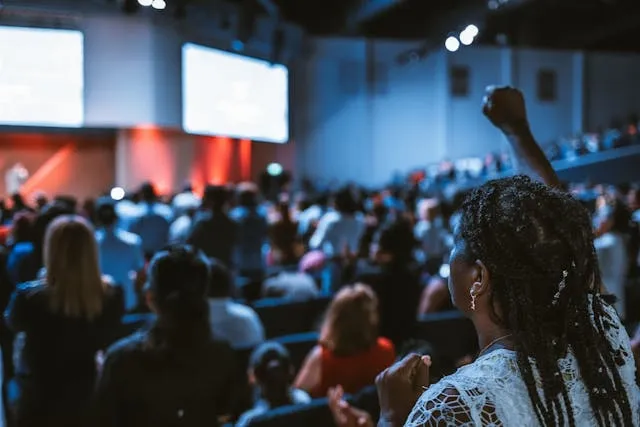Conference Planning Checklist: Complete Event Template With Tips
To plan for a successful conference, you have to juggle countless details from venue selection to coordinating speakers. Our detailed conference planning checklist will help simplify the process, enabling you to stay organized and on course for the right outcome.
In this guide, you will find tips and step-by-step instructions to ensure you don’t lose track on your conference planning path. Make an impression with attendees and achieve your goals.

Key Takeaways
- A detailed conference planning checklist helps streamline the processes of setting goals, budgeting, selecting a venue, and scheduling for your event.
- There should be specific sections for contingency plans for unexpected issues and challenges - this illustrates the level of detail required in your checklist.
- Be sure to gather feedback to measure the success of your event afterwards. This will help for creating a conference planning checklist in subsequent events.
- We supply high-quality custom tablecloths that you can use at conferences to enhance the aesthetics and experience as well as displaying brand assets and other key information.
Table of contents
-
Complete Conference Planning Checklist
-
What Are The 10 Steps To Planning A Successful Conference?
-
Planning A Church Conference Checklist
-
What Questions Should You Ask When Planning A Conference Event?
-
How Can You Use A Conference Checklist Template To Structure A Conference For Maximum Impact?
-
What Are The Best Practices For Setting A Conference Budget?
-
How Do You Choose The Right Venue For Your Conference?
-
How Do You Plan The Conference Agenda And Schedule?
-
How Can You Effectively Promote Your Conference?
-
What Are The Key Elements Of A Successful Conference?
-
How Can You Make A Conference More Fun And Engaging?
-
What Are The Common Challenges In Conference Planning?
-
How To Plan For Hybrid Conference Success In 2025 And Beyond
Complete Conference Planning Checklist
An incredible 98% of U.S. federal employees agree that in-person events like conferences are important for advancing their agency’s mission. Success starts with successful event planning. To compile a thorough conference event planning checklist, you need to cover every detail. The key elements include:
- Setting clear goals to guide decisions. These include:
- Venue selection criteria
- Accounting for capacity
- Location
- Accessibility
- Creating a detailed budget. You must balance costs across:
- Venue
- Catering
- Technology needs
- Establishing a timeline:
- Identify key milestones
- Assign specific tasks to team members
- Create contingency plans:
- These are essential for addressing unexpected issues that may arise
- Guest experience. You will need to focus on things like:
- Smooth registration
- Engaging content
- Hospitality
You should cover tech requirements like WiFi and AV setup as early as possible to be fully prepared. Even small details like measuring tables for tablecloths should be considered for a polished, professional experience at the event.

Importance Of A Conference Event Planning Checklist
It is crucial to compile a detailed conference planning checklist when preparing for and executing a conference. It will help you ensure all aspects of the event are addressed, from goal setting through budgeting and venue selecting.
A comprehensive checklist offers the following benefits:
- Organizing tasks
- Assigning responsibilities
- Establishing clear deadlines
- Reducing the risk of overlooking critical details
It also enables efficient coordination among your team members, with streamlined communication and a means of focusing on all the required elements.
The anticipation of potential issues allows for contingency plans, which can be accommodated in your checklist. Ultimately, compiling a thorough checklist lifts the overall quality of the event and contributes to a more enjoyable and professional experience for attendees. They are vital tools for successful conference planning.
What Are The 10 Steps To Planning A Successful Conference?
Here are the 10 essential steps for planning a successful conference with a checklist:
- Set goals: Make sure you are clear about your objectives for planning and measuring success.
- Establish a budget: Create a detailed budget that covers all the relevant expenses.
- Choose a date and venue: Select a convenient date and book a venue that meets your practical needs.
- Develop a program: Outline your conference agenda, including sessions, speakers, and breaks.
- Secure speakers and vendors: Invite appropriate keynote speakers and contract vendors for key services.
- Promote your event: Choose the appropriate channels to market your conference and attract attendees.
- Handle registrations: Set up a registration system for managing attendee sign-ups and payments
- Prepare materials: Your conference will need materials like programs, badges, and promotional items.
- Execute the event: Facilitate smooth operation of the conference on the day, overseeing logistics and addressing issues as they arise.
- Conduct a post-event follow-up: Gather feedback and evaluate the event’s success. NBe sure to thank participants and sponsors.
Get the perfect tablecloth for your conference tables
Our custom conference tablecloths can be tailored to the size, shape, and aesthetic requirements of your conference tables to ensure everything is perfect for your needs.
Planning A Church Conference Checklist
Here is a church conference event planning checklist template to help with your success:
- Define the purpose of your conference to set clear objectives.
- Assess the congregation size to determine the number of attendees.
- Select a venue, whether indoor or outdoor, based on size requirements.
- Budget carefully for things like venue, catering, and materials.
- Invite the speakers or facilitators who will make your conference happen.
- Plan decorations for tables, like learning how to decorate with table runners.
- Choose a date that aligns with your congregation’s availability.
- Use church newsletters and social media to raise awareness of your conference.
- Arrange logistics like seating, AV equipment, and registration.
- After the conference, gather feedback and thank participants.
What Questions Should You Ask When Planning A Conference Event?
When creating your conference event planning checklist, the following questions are critical:
- Who is the primary audience? What are their needs and preferences?
- What are the main goals of the conference? What outcomes are desired?
- What is the budget and how will costs be managed? Remember, 80% of organizations now consider sustainability in event planning.
- What type of venue is required? Is it accessible? Will it accommodate all attendees?
- Who are the speakers and what topics will they be covering?
- What AV and seating requirements do you have? Are there transportation and accommodation needs?
- How will the event be promoted? What channels are available?
Tailor these questions to suit the focus of your conference to optimize your planning and execution.

Looking for the perfect table covers for your next event?
Our custom event tablecloths are available in a range of shapes and sizes and you can personalize the design to work for your brand or aesthetic.
Explore options hereHow Can You Use A Conference Checklist Template To Structure A Conference For Maximum Impact?
Using a conference planning checklist effectively structures your event to maximize its impact. This starts with exploring different layout options to enhance attendee engagement. You should consider layouts that accommodate interaction, like classroom-style setups for workshops, for instance. This includes choosing decoration options like custom print-on-demand tablecloths with your branding for effective company marketing.
Your checklist should cover things like:
- Venue setup
- Technology needs
- Seating arrangements
Develop a compelling agenda that aligns with your conference goals. You should outline key sessions, speaker slots, and breaks so that the program is engaging and well-paced. Incorporate interactive elements like Q&A sessions or networking opportunities to maintain interest.
Your checklist should track progress and ensure all logistical details are covered. With a structured approach, you create a seamless, impactful experience for all participants.
What Are The Best Practices For Setting A Conference Budget?
When setting your conference budget, your starting point should be to prioritize spending on essential items. These include:
- Venue
- Catering
- Marketing
Allocate a substantial portion of your budget to these areas to deliver a high-quality experience. You should also include a contingency fund of 10-15% for unexpected expenses like last-minute venue changes or technical issues.
Explore multiple vendors to compare quotes and make informed decisions to avoid overspending. Your budget should be broken down into categories like logistics, staffing, and promotional activities. Track your expenses meticulously as you go.
Review your budget regularly to make adjustments for discrepancies and keep your spending within financial limits. For effective budget planning, you must be skilled at forecasting and have the flexibility to accommodate unforeseen costs whilst sticking to the original plan as closely as possible.
Create a dark, neutral look for your conference aesthetic
Order custom black event tablecloths from us to get the look your want on tables at your conference or other corporate event, with bulk ordering available.
How Do You Choose The Right Venue For Your Conference?
Choosing the right venue for your conference is a key part of your conference planning checklist. There are several key considerations, the first of which involves assessing the venue’s capacity to ensure it can comfortably accommodate the expected number of attendees.
Location is another key consideration. Select a site that is accessible for your participants, ideally near public transport and accommodations. Evaluate the facilities at the venue, including things like:
- Audio-visual equipment
- Breakout rooms
- Catering options
Think about aesthetics as well. People often think about the best tablecloth color for craft shows and similar events, but a cohesive aesthetic at a conference can make a big difference to the experience.
When negotiating contracts, be clear about what is included in the rental fee. Look for opportunities for flexibility in contract terms and ask about cancellation policies. A thorough review and negotiation process will help ensure the venue you get supports a successful conference.
How Do You Plan The Conference Agenda And Schedule?
Successful planning of a conference agenda begins with a good understanding of your key objectives and main topics. Break the schedule down into sessions that ensure a good balance between informative content and opportunities to interact.
Networking is crucial to attendees, so incorporate breaks that facilitate engagement and prevent fatigue. Time buffers between sessions also help accommodate overruns and allow for transitions. Make use of scheduling tools and communicate your agenda clearly to all participants.
Review your schedule regularly to ensure it stays on track, and nominate a timekeeper to take responsibility for session lengths and ensure a smooth flow throughout.
Need to add a logo or other design to your conference tablecloths?
Using advanced dye sublimation printing techniques, we create custom printed tablecloths in any color that can display any graphic you want for branding.
Learn moreHow Can You Effectively Promote Your Conference?
For effective conference promotion, you should look at a multi-channel marketing strategy. According to Marketing Charts, 61% of B2B marketers are successful in generating qualified leads through webinars. But you should also use things like:
- Social media to generate buzz and share updates.
- Targeted ads to reach your audience.
- Email newsletters to reach past attendees and subscribers.
You can create a dedicated event website with engaging content and simple registration options. Your pre-event webinars will generate interest and provide a taster of what your conference will offer, and you can partner with influencers or industry leaders to extend your reach.
Make use of SEO and content marketing to drive organic traffic. At your event, use custom printed tablecloths with your logo and other key information to keep the momentum up.
What Are The Key Elements Of A Successful Conference?
There are various key elements to a successful conference that you can build towards in your conference planning checklist.
- Attendee satisfaction: To keep this high, focus on a well-organized schedule, engaging sessions, and good customer service.
- Quality speakers: Your speakers should be knowledgeable, relevant to your field, and engaging to make the attendees’ experience more valuable.
- Return on Investment (ROI): Measure this by analyzing registration numbers, assessing revenue vs expenses, and gathering feedback from attendees.
Collecting feedback is done through surveys that gather insights into key metrics. This feedback will help you refine future conferences so that you can improve continuously. Track networking opportunities and post-event engagement as well, as they also contribute to the conference’s success in the context of strategic goals.
Post-Event Strategies To Extend Conference Value
Your planning checklist should include post-event engagement tactics to keep your audience connected beyond the closing session. Let’s look at some essential steps:
- Within 48 hours, send attendees a thank-you email with access to presentation slides, session recordings, and bonus materials.
- Create a post-event survey to gather feedback on specific sessions, speakers, and logistics to shape future events.
- Encourage ongoing networking by inviting attendees to join a private community or LinkedIn group.
- Highlight key takeaways in a summary video or blog post and tag speakers or attendees on social media to increase visibility.
- Schedule follow-up webinars or virtual roundtables to build on popular topics.
Integrate these steps into your checklist to help transform your conference from a one-day experience into a year-round engagement tool.
How Can You Make A Conference More Fun And Engaging?
Make a conference more fun and engaging by ensuring interactive elements are included in your conference event planning checklist. Options with a proven success rate include:
- Q&A sessions
- Workshops
- Live polls
Allow attendees to take part in discussions and hands-on activities that enhance their experience and encourage deeper engagement. You can also organize social events like themed dinners and casual mixers that facilitate networking in a relaxed setting.
You can create an environment conducive to networking with dedicated lounges. Tables can be outfitted with custom digital print tablecloths that include your logo or social media handles to further connect with attendees. Alternatively, set up networking zones with structured activities like speed networking or roundtable discussions.
Gamification, like scavenger hunts or competitions, can add a fun element that boosts engagement. The focus should be on creating a dynamic atmosphere that makes the conference valuable and memorable for attendees.

What Are The Common Challenges In Conference Planning?
Conference planning, even with a checklist, can encounter a number of common challenges. You should have a robust, detailed financial plan with contingency funds for unexpected costs, and keep track of expenses like the cost of renting a tablecloth. This will help keep ahead of the common concern of budget overruns.
Other common challenges include:
- Low attendance: You need a robust marketing strategy that leverages social media, email campaigns, and partnerships to attract registrants.
- Technical issues: Mitigate these through thorough equipment checks and make sure technical support is on standby. Test all AV equipment before the event.
A detailed timeline and conference planning checklist will help keep track of tasks and their deadlines. Review progress frequently and address potential issues promptly. With proactive planning for common challenges, you can enhance your conference’s overall success.
How To Plan For Hybrid Conference Success In 2025 And Beyond
Hybrid conferences are events where in-person and virtual audiences participate simultaneously, and they are becoming the standard for many industries. To plan effectively, decide early whether your event will be hybrid and ensure your budget accounts for additional tech needs such as:
- High-quality streaming equipment
- Dedicated production staff
- Reliable backup internet
Develop a parallel agenda for virtual attendees that incorporates interactive tools like live chat, breakout rooms, and polls that help keep engagement high. Test all connections, camera angles, and audio in advance, and rehearse transitions between in-person and virtual segments.
Also, provide clear instructions for remote attendees on accessing sessions, networking platforms, and downloadable materials. Consider time zone differences to schedule high-interest sessions when the majority of attendees can join live. This dual-format approach widens your audience reach and helps future-proof your event.
Frequently Asked Questions About Conference Planning Checklist
What To Include In A Conference Planning Checklist?
There are many things to include in a conference planning checklist. Your goals, budget, timeline, contingency plans, marketing efforts, and strategies for maximizing the guest experience should all be included.
What Factors Should You Consider Before Choosing The Venue For Your Conference?
You need to ensure you pick a venue that can accommodate the expected number of attendees. Location and accessibility are important, as is the consideration of equipment and catering. And you need to ensure the aesthetics of the venue are right.